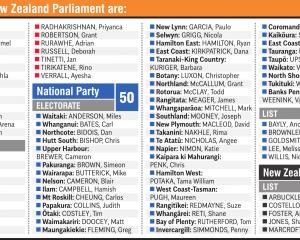
Regardless of the outcome of the election, commercial property owners can expect they will lose the ability to claim depreciation on their buildings as both Labour and National have included this measure in their tax policies.
Both National and Labour have pledged to increase the Working For Families tax credit and increase the abatement threshold for this tax credit. Therefore, households with children that are eligible for Working For Families can expect to have some extra income in their pockets also regardless of the election outcome.
The trustee tax rate is to increase from 33% to 39% to align with the top personal tax rate from April 1, 2024. National has remained silent on this increase, so presumably this will go ahead if it leads the next government.
On the left of the political spectrum both the Greens and Te Pāti Māori are proposing a radical overhaul of the tax system. Both are proposing tax-free thresholds, the Greens $10,000 and Te Pāti Māori $30,000, along with changes in tax brackets and increases in personal tax rates, the Greens to 45% and Te Pāti Māori to 48%. They both want to increase the company tax rate back to 33%. The Greens and Te Pāti Māori are also both in favour of a wealth tax.

While Labour has not proposed changes to tax rates (beyond the change in trustee rate announced in the Budget) and has ruled out a wealth tax, the Budget 2023 tax initiatives information release show it was considering both. This information release indicates Labour was considering an $8500 tax-free threshold with a 1.5% wealth tax on net assets over $5 million.
Te Pāti Māori wants to remove GST from all food and New Zealand First from "basic" foods, both of which go further than Labour’s proposal to remove GST from "fresh fruit and vegetables".
Perhaps coalition negotiations could see GST removed from a broader range of food products than Labour is proposing.
On the right of the political spectrum, National is proposing adjustments to the thresholds for the 17.5% and 30% personal tax rates, while Act New Zealand’s proposal is more radical, involving the elimination of the 10.5%, 30%, 33% and 39% tax rates.
To compensate low-income earners for the removal of the 10.5% tax rate, Act would introduce a low-middle-income tax offset, effectively a tax credit to eligible taxpayers. New Zealand First also supports inflation-adjusting the personal tax rate thresholds.
Both National and Act proposed using funds generated from the Emissions Trading Scheme to pay a climate dividend or carbon tax refund to taxpayers. Therefore, taxpayers can expect to receive some sort of payment of this nature if the election results in a National/Act government.
With a National/Act government we can also expect deductibility of interest in relation to residential properties to be reinstated and changes to the bright-line test that taxes residential land sales.
With regards to interest deductibility National is proposing a phased re-introduction, whereas Act wants full deductibility re-introduced immediately.
National and Act also differ on what changes should occur to the bright-line. National proposes to drop the bright-line period back to the original two years from the present 10 years and Act wants to abolish the bright-line test altogether.
National is also proposing to remove or not progress some taxes but will introduce some new taxes of its own.
It will not proceed with the increases in fuel tax and remove the Auckland regional fuel tax.
It will also repeal the legislation introducing the so-called "app tax" imposing GST on all services provided through apps such as Uber and Airbnb.
National will introduce new taxes on overseas property purchases and overseas online gambling platforms, and increase immigration levies.










